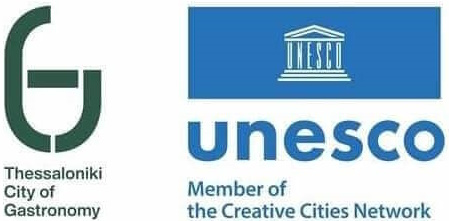
Thessaloniki...Unesco City of Gastronomy

Thessaloniki...Unesco City of Gastronomy

Thessaloniki...Unesco City of Gastronomy





For the city of Thessaloniki, gastronomy is culture. With a history spanning more than 2,300 years, rich in tradition and culture, a significant milestone is achieved through international acknowledgment—the inclusion in UNESCO’s Creative Cities Network (UCCN). A heritage that, driven by sustainability and innovation, engages in an international dialogue of creativity with the aim of development in the economy, society, and the environment, fostering inclusivity.
It is this heritage that has shaped the character of a modern European city, now recognized as one of the finest gastronomic destinations in Europe. After all, there is no shortage of references and features from globally renowned publications (The Guardian, The New York Times, BBC, Travel Planet, Discovery Channel, National Geographic), as well as travel writers, highlighting Thessaloniki’s gastronomy.
The interweaving of nationalities and cultures is a fundamental component in the DNA of the city, which from its inception has been an urban center and continues to evolve as such, over the centuries. Ottomans, Jews, Armenians, Asia Minor Greeks – they brought their flavors, traditions, morals, customs, recipes, and ingredients to the city, thereby shaping its local cuisine in the process.
With a population exceeding one million, according to the 2021 census, it is the second-largest economic, industrial, and commercial center in Greece. It serves as a robust economic and transportation hub in the Balkans, playing a significant role in trade and tourism.
Thessaloniki is home to 15 UNESCO World Heritage Sites, and its city center resembles an open-air museum of art and culture. Since the first settlement in 315 BC, it has served as a center throughout the Hellenistic, Roman, Byzantine, and Ottoman eras, contributing to its rich multicultural gastronomic identity. This identity harmoniously intertwines with its Mediterranean roots.
Its gastronomic heritage, along with the creativity of its chefs and residents, has contributed to the creation of a contemporary local cuisine with its own identity and a plethora of flavors, making excellent use of local products, such as olive oil, dairy and cheese products, fruits and vegetables, fish, and meat. Every corner of the city has a story to tell, intimately connected with its gastronomy.
Since 2011, the “Thessaloniki Food Festival” has been an internationally acclaimed event within the gastronomic community, which continues to host a multitude of events, drawing many visitors from both Greece and abroad.
Gastronomy is an important part of the city’s economy. According to the data from ELSTAT (2020), Thessaloniki has 5,637 restaurants with an annual turnover of 378 million euros and 50,000 employees. In the food sector, i.e. bakery products, flour, cheese, milk, meat, seafood, wines and other products, there are 2,600 businesses operating with an annual turnover of 1 billion euros and 12,300 employees.
Moreover, Thessaloniki is one of the country’s most important research and academic centre, a fact that contributed to its inclusion in the UNESCO network of gastronomy cities. The city is involved in more than 20 European projects related to food, aiming to explore innovative solutions and best practices in collaboration with other cities on an international level.
Thessaloniki is the first Greek city to join the UNESCO Creative Cities Network, on the initiative of the Municipality of Thessaloniki. The strategic collaboration between the Municipality of Thessaloniki, the Ministry of Tourism, and the Greek National Commission for UNESCO resulted in the city earning this distinction.
The goal through this Network is:
a) Strengthening Thessaloniki’s tourist identity as a gastronomic destination,
b) Enhancing co-operations among the city’s stakeholders,
c) Encouraging the extroversion of the city,
d) Strengthening the local cuisine and its creators.
This inclusion also marks a new era for Thessaloniki, in terms of innovation and creativity, within the framework of Sustainable Urban Development Goals, to ensure quality living for its residents and visitors.

For the city of Thessaloniki, gastronomy is culture. With a history spanning more than 2,300 years, rich in tradition and culture, a significant milestone is achieved through international acknowledgment—the inclusion in UNESCO’s Creative Cities Network (UCCN). A heritage that, driven by sustainability and innovation, engages in an international dialogue of creativity with the aim of development in the economy, society, and the environment, fostering inclusivity.
It is this heritage that has shaped the character of a modern European city, now recognized as one of the finest gastronomic destinations in Europe. After all, there is no shortage of references and features from globally renowned publications (The Guardian, The New York Times, BBC, Travel Planet, Discovery Channel, National Geographic), as well as travel writers, highlighting Thessaloniki’s gastronomy.
The interweaving of nationalities and cultures is a fundamental component in the DNA of the city, which from its inception has been an urban center and continues to evolve as such, over the centuries. Ottomans, Jews, Armenians, Asia Minor Greeks – they brought their flavors, traditions, morals, customs, recipes, and ingredients to the city, thereby shaping its local cuisine in the process.
With a population exceeding one million, according to the 2021 census, it is the second-largest economic, industrial, and commercial center in Greece. It serves as a robust economic and transportation hub in the Balkans, playing a significant role in trade and tourism.
Thessaloniki is home to 15 UNESCO World Heritage Sites, and its city center resembles an open-air museum of art and culture. Since the first settlement in 315 BC, it has served as a center throughout the Hellenistic, Roman, Byzantine, and Ottoman eras, contributing to its rich multicultural gastronomic identity. This identity harmoniously intertwines with its Mediterranean roots.
Its gastronomic heritage, along with the creativity of its chefs and residents, has contributed to the creation of a contemporary local cuisine with its own identity and a plethora of flavors, making excellent use of local products, such as olive oil, dairy and cheese products, fruits and vegetables, fish, and meat. Every corner of the city has a story to tell, intimately connected with its gastronomy.
Since 2011, the “Thessaloniki Food Festival” has been an internationally acclaimed event within the gastronomic community, which continues to host a multitude of events, drawing many visitors from both Greece and abroad.
Gastronomy is an important part of the city’s economy. According to the data from ELSTAT (2020), Thessaloniki has 5,637 restaurants with an annual turnover of 378 million euros and 50,000 employees. In the food sector, i.e. bakery products, flour, cheese, milk, meat, seafood, wines and other products, there are 2,600 businesses operating with an annual turnover of 1 billion euros and 12,300 employees.
Moreover, Thessaloniki is one of the country’s most important research and academic centre, a fact that contributed to its inclusion in the UNESCO network of gastronomy cities. The city is involved in more than 20 European projects related to food, aiming to explore innovative solutions and best practices in collaboration with other cities on an international level.
Thessaloniki is the first Greek city to join the UNESCO Creative Cities Network, on the initiative of the Municipality of Thessaloniki. The strategic collaboration between the Municipality of Thessaloniki, the Ministry of Tourism, and the Greek National Commission for UNESCO resulted in the city earning this distinction.
The goal through this Network is:
a) Strengthening Thessaloniki’s tourist identity as a gastronomic destination,
b) Enhancing co-operations among the city’s stakeholders,
c) Encouraging the extroversion of the city,
d) Strengthening the local cuisine and its creators.
This inclusion also marks a new era for Thessaloniki, in terms of innovation and creativity, within the framework of Sustainable Urban Development Goals, to ensure quality living for its residents and visitors.

For the city of Thessaloniki, gastronomy is culture. With a history spanning more than 2,300 years, rich in tradition and culture, a significant milestone is achieved through international acknowledgment—the inclusion in UNESCO’s Creative Cities Network (UCCN). A heritage that, driven by sustainability and innovation, engages in an international dialogue of creativity with the aim of development in the economy, society, and the environment, fostering inclusivity.
